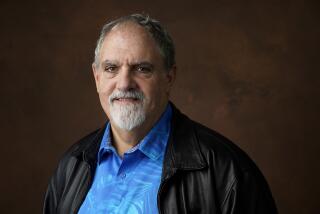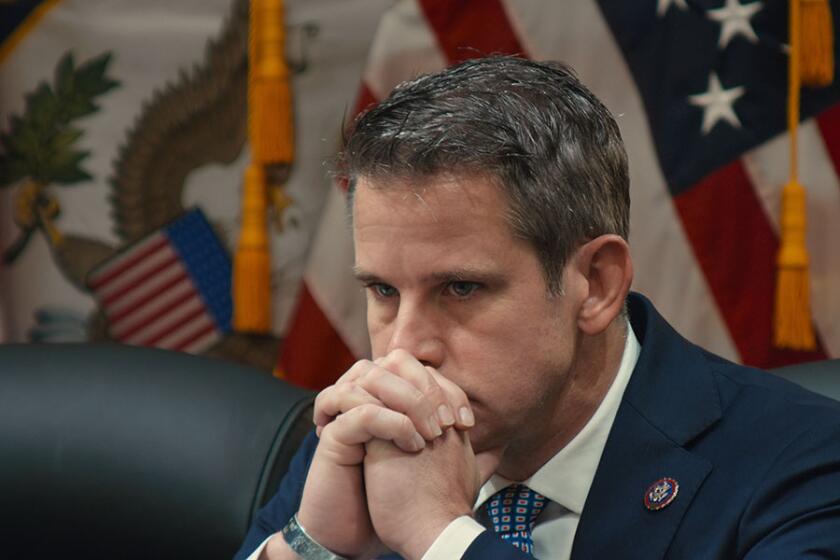J.L. Thompson, 88; Prolific Director of Action Films
J. Lee Thompson, the British-born film director best known for the World War II action drama “The Guns of Navarone,” the original “Cape Fear,” and a string of Charles Bronson action thrillers made during a four-decade directing career, has died. He was 88.
Thompson, who also introduced a young Hayley Mills to the screen, died of congestive heart failure Friday at his summer home in Sooke, on Vancouver Island, British Columbia, Canada.
In a directing career that began in 1950 and spanned 56 films, Thompson’s credits include four films starring Gregory Peck (“The Guns of Navarone,” “Cape Fear,” “Mackenna’s Gold” and “The Chairman”) and nine films starring Charles Bronson, including “Death Wish 4: The Crackdown” “The Evil That Men Do,” “Messenger of Death” and “Murphy’s Law.”
He also directed “Taras Bulba,” “John Goldfarb, Please Come Home,” “What a Way to Go!” a 1974 musical version of “Huckleberry Finn,” “The Reincarnation of Peter Proud,” “The Greek Tycoon” and two “Planet of the Apes” films--”Conquest of the Planet of the Apes” and “Battle for the Planet of the Apes.”
Although best known for the action-adventure films he made after moving to Los Angeles in the wake of the 1961 success of his Oscar-nominated “The Guns of Navarone,” Thompson earned critical acclaim while forging his career as a director of commercial and socially relevant films in England in the 1950s.
He was hailed as the finest filmmaker to emerge from the British studio system after World War II.
He won the Berlin Film Festival’s International Critics Award three years in a row for “Woman in a Dressing Gown,” “Ice-Cold in Alex” and “Tiger Bay,” the 1959 film that introduced a 12-year-old Mills, whose performance as a lonely child who is abducted after witnessing a murder led Walt Disney to cast her in the 1960 film that made her an international star, “Pollyanna.” “He had an incredible career,” said Pancho Kohner, who produced nine Thompson films starring Bronson.
“He made so many marvelous films that really haven’t been shown here, the early films. ‘Ice-Cold in Alex,’ starring John Mills and Anthony Quayle, was one of his great films. ‘Yield to the Night,’ with Diana Dors and Yvonne Mitchell, won the Cannes Film Festival special award.”
Thompson’s early films, shot in black and white, “had a gritty reality to them,” said Kohner. “He called them his kitchen sink films.”
Thompson’s American films, beginning with “The Guns of Navarone” in 1961, were on a much larger scale, Kohner said.
He was a replacement for the original director, British filmmaker Alexander Mackendrick, who was fired from the production after a few days’ work on location in Greece.
Thompson had only 10 days to do pre-production on the adventure-thriller about Allied commandos who launch a daring assault on a Nazi fortress on a Greek island.
Writer-producer Carl Foreman chose Thompson to take over because he had admired “Tiger Bay” and his 1959 action-adventure film “Flame Over India.”
“He gave those films to Gregory Peck and David Niven to look at because in their contracts they had the right [to approve] the director,” Thompson said in an interview in 2000. “They both loved the films.”
“The Guns of Navarone” became the biggest hit of 1961 and earned seven Oscar nominations, including those for best picture, director and screenplay, and was a winner for special effects.
But while it established Thomas as a bankable director of big-budget Hollywood films, he later had reservations over it being the one film for which he would forever be identified.
“I feel like since I came to America I’m rather like an old friend of mine, the producer David Selznick,” Thompson told a Canadian newspaper two years ago. “David said, ‘I almost regret having made “Gone With the Wind,” because that’s the only film anyone ever remembers me for.’ I know what he’s talking about.”
Born in Bristol, England, in 1914, Thompson joined the Nottingham Repertory Company at age 17 and by 20, had two of his plays performed in London.
He began his career in films as an actor in 1934 and moved into screenwriting in 1939.
After serving as a tail gunner and a radio operator in the Royal Air Force during World War II, he made his debut as a film director in 1950 with “Murder Without Crime,” which he wrote.
In the foreword to “J. Lee Thompson,” a biography by Steve Chibnall, and published by Manchester University Press in 2000, Sir John Mills said he always thought Thompson was underrated as a director.
Mills, who worked twice with Thompson--on “Ice-Cold in Alex” and “Tiger Bay--praised Thompson’s technical brilliance as well as his ability to always get the best out of actors.
In launching his daughter, Hayley, on her film career in “Tiger Bay,” Mills wrote, Thompson “handled her superbly, and she turned in a really marvelous performance.”
In directing Bronson in nine films, Kohner said: “[Thompson] was a gentleman and a pleasure to be round. The crew would work 48 hours straight for him. They loved him and his actors did, too. He had a terrific sense of humor, and he was their rallying point. He was definitely the leader of the film crew, and they looked at him and respected him tremendously.”
Thompson is survived by his wife of 40 years, Penny; a daughter, Lesley; and a granddaughter. His son, Peter Lee, is deceased.
A memorial service will be held Sept. 14 at a chapel on Vancouver Island.
Thompson, a longtime resident of Beverly Hills, was an animal lover, and his family suggests that memorial con-tributions be made to an animal shelter of the donor’s choice.
More to Read
Only good movies
Get the Indie Focus newsletter, Mark Olsen's weekly guide to the world of cinema.
You may occasionally receive promotional content from the Los Angeles Times.










